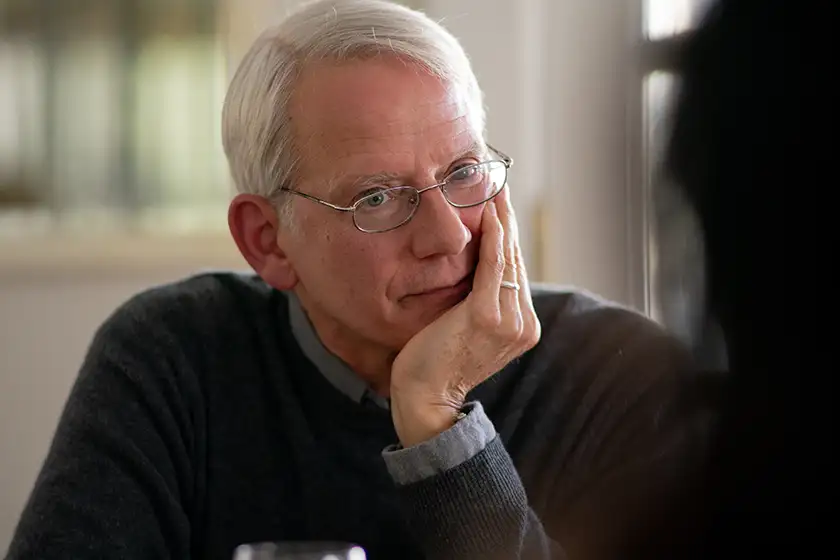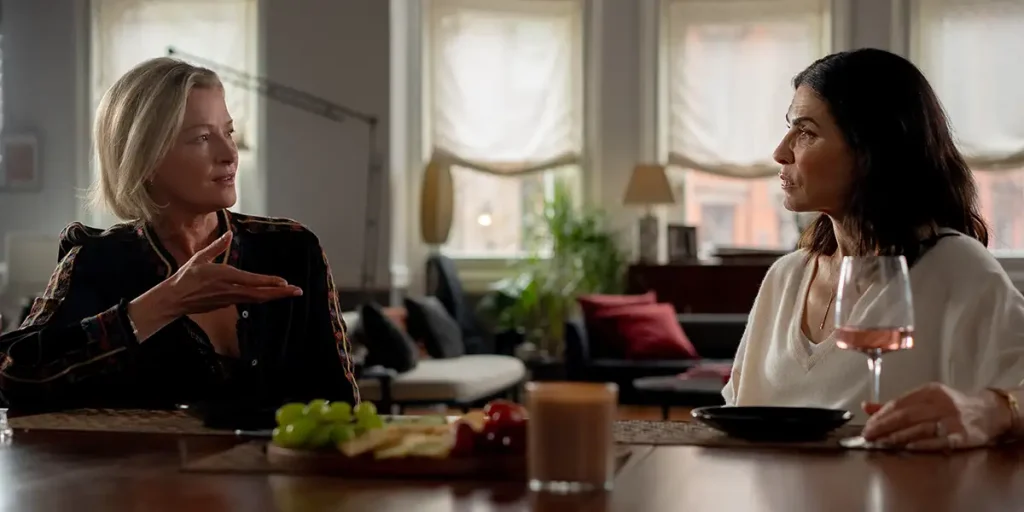Edward Burns’ Millers in Marriage is a perfectly serviceable domestic drama with a stellar cast and clever dialogue.
Director: Edward Burns
Genre: Drama
Run Time: 117′
Rating: R
U.S. Release: February 21, 2025
U.K. Release: TBA
Where to Watch: In select US theaters and on Digital Platforms
Written, directed and starring Edward Burns (of The Brothers McMullen, Saving Private Ryan and Flight of the Phoenix), Millers in Marriage is a simple enough drama centred on three middle-aged married couples undergoing important changes. It’s nothing we haven’t seen before, thematically dealing with the passage of time, regrets, love, betrayals and jealousy. Still, it’s all sufficiently well-written and allows its considerably talented cast to develop credible, well-rounded characters.
Millers in Marriage doesn’t gain any points for originality, but if you’re looking for a mature drama and some clever dialogue, you could do much worse than this.
The first of the three main couples consists of Maggie (Julianna Margulies) and Nick (Campbell Scott). The former is a thriving novelist who is finishing her latest book and feels pretty frustrated with her marriage, while the latter is a has-been writer stuck in a rut, conscious of the fact that he’s not as good as his wife. Then, we have painter Andy (Burns) and British girlfriend Renee (Minnie Driver). They are having problems due to the presence of his ex, Tina (Morena Baccarin, of Deadpool fame) who doesn’t seem to accept the fact that she’s no longer married to Andy. And finally, there’s Eve (Gretchen Mol), who’s grown tired of husband Scott’s (Patrick Wilson, of The Conjuring films) alcoholism, and thus is considering starting an affair with an attractive music journalist (Benjamin Bratt).
On paper, most of the conflicts in Millers in Marriage might feel like soap opera material, centring on stereotypical alcoholics, affairs, jealous husbands and more. Thankfully, Burns manages to give his story a serious tone, avoiding melodrama whenever he can, and trying to give his characters some much-needed humanity. Thus, the viewer never gets the sense that they’re watching anything too contrived or predictable, with most of the stories feeling like something they could encounter in real life with real people. It’s a tricky balance between realism and drama, but Burns overall manages to achieve it, albeit imperfectly.

It helps that he’s convinced an impressive group of actors to give life to these characters. Gretchen Mol and Campbell Scott are particularly impressive. The former turns a potential stereotype (the “tired wife”) into a living, breathing human being; into someone who doesn’t necessarily want to get involved in an affair, but who, at the same time, knows she doesn’t love her husband anymore, and is stuck in a toxic and sexless relationship with little communication. And the latter gives a subdued, subtle performance as a man who is going through a lot emotionally, but who clearly has trouble expressing his complicated emotions as a more “traditional” heterosexual man.
Obviously, the rest of the cast is also good; I was particularly glad that Burns decided to play one of the less pleasant characters, turning Andy into an immature man who has decided to start a new relationship when he clearly hasn’t been able to move on from the previous one. As his counterpart, Minnie Driver is equally good, playing Renee in a very sympathetic manner, developing her as a kind woman who, actually, ends up being more patient and understanding than what Andy ultimately deserves. On the other hand, I do feel Morena Baccarin is wasted in a very flat role, that of the stereotypical “problematic ex”.
Now, even though I don’t feel there’s anything particularly wrong with Millers in Marriage, I don’t believe there’s anything particularly amazing about it either. The dialogue is very naturalistic and allows the actors to feel quite laid-back during most of their conversations, but the plot and subplots themselves aren’t anything to write home about. In fact, the film can be accused of being solely about “white people’s problems”, something that Burns would pretty much agree with, considering one of his characters admits to being involved with “rich people and their champagne problems”. Not that there’s anything wrong with portraying these conflicts, but it does end up making the movie feel a bit superficial, like we’re dealing with problems that ultimately aren’t very important. The stakes aren’t very high, and thus, the viewer never ends up being completely invested in the proceedings.
Millers in Marriage feels like a vestige of a simpler time; a movie that would have probably been rather successful in the nineties, but that nowadays feels a bit tired and predictable and even self-centred. The performances are all pretty great, and Edward Burns keeps showing that he has a knack for naturalistic dialogue and credible characterisations. But the film as a whole doesn’t really click, feeling like a bunch of well-worn stories that could’ve used a bit more tension, surprises and energy. Millers in Marriage is a good enough drama, and it does represent a style of filmmaking that we don’t see that much anymore, but unfortunately, it’s not the rousing success it could have been.
Millers in Marriage: Movie Plot & Recap
Synopsis:
Three middle-aged married couples must deal with their personal problems as they come to terms with their age.
Pros:
- Good, naturalistic dialogue.
- Excellent performances.
- Nice pacing and well-balanced tone.
Cons:
- Not very original.
- Quite predictable.
- Can feel a bit like “White People’s Problems: The Movie”.
- Stakes aren’t high enough.
Millers in Marriage will be released in select US theatres and on digital platforms on February 21, 2025.

